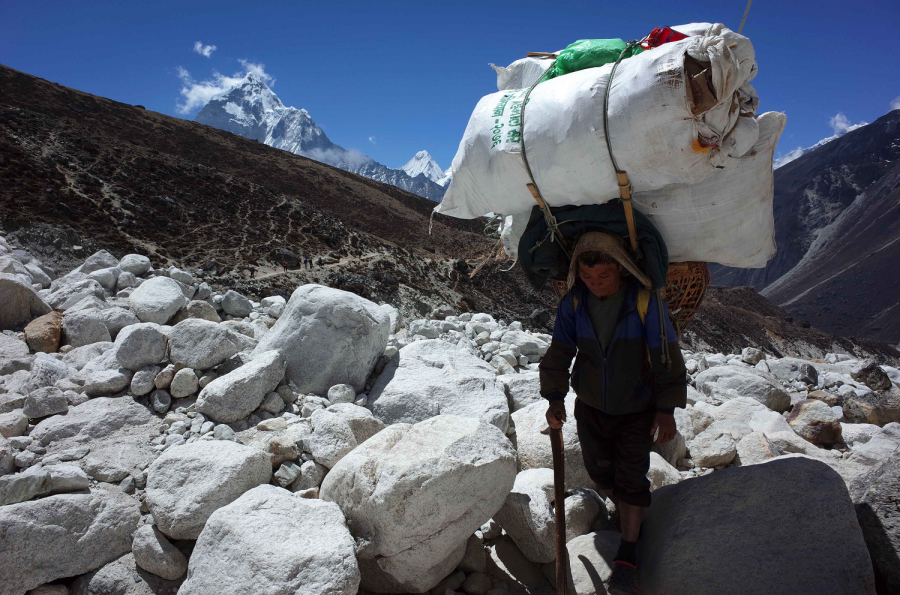Money
Nepal Tourism Board seeks Rs 20 billion fund to pay furloughed workers
The government will pay at least 30 percent of the salary under the proposed scheme.
Sangam Prasain
The Nepal Tourism Board has asked the government to set up a Rs20 billion coronavirus job retention fund to partially pay the salaries of furloughed tourism workers.
Lockdown restrictions have shut down the tourism industry, and employers ranging from hotels and restaurants to travel and trekking firms are hard pressed to pay their staff and high-altitude mountaineering guides with no revenues coming in.
“The coronavirus job retention scheme will provide support to employers to enable them to continue paying part of the salaries of their employees who have been furloughed instead of being laid off during the initial period of the crisis,” said Dhananjay Regmi, chief executive officer at the Nepal Tourism Board.
The government will pay at least 30 percent of the salary through the fund on the basis of the employee's application and the company's confirmation that they have been furloughed.
“So if the company pays 30 percent, the employee will get 60 percent of the salary in this crisis period,” the head of the tourism promotional body said.
The scheme is designed to help jobholders who have been given leave due to the coronavirus outbreak, and prevent employers from having to resort to mass redundancies, he said.
Regmi said the tourism employees would have to pay the government back gradually at some future date. It will all depend on the government policy to recover the money paid to the workers, said Regmi.
“This fund will save both employees and employers amid uncertainties over when the tourism industry will reopen.”
A forced furlough, when employees are sent away on leave due to economic or social conditions, is new to Nepal; but is widely implemented in many European countries. The scheme helps firms hit by the virus lockdown to temporarily pay the wages of their staff even though they aren't working.
The United Kingdom government's furlough programme is paying the wages of more than a quarter of jobs. About 7.5 million workers in the United Kingdom have been furloughed since March, with the government paying up to 80 percent of their salaries.
Hotels teetering on the edge amid the coronavirus closure have recently decided to cut their losses by remaining shuttered for six months, as they don't expect tourists to visit Nepal for at least another year.
Officials said more than 3,000 hotels will send their staff home because they can't keep paying their salaries with their income cut off due to the lockdown.
"It is hard for operators to keep paying the employees as nobody knows how long the pandemic will last," Binayak Shah, senior vice-president of Hotel Association Nepal, told the Post in a recent interview.
"Even if the lockdown is lifted, the tourism industry will take time to recover because travellers will not immediately book foreign trips. The hotels will all be bankrupt by the time tourism rebounds as they have to pay staff salaries while income has come down to zero," he said. "So closing the hotels is the best way to protect ourselves."
As part of the bailout measures for the hospitality industry, the government should pay the workers through the social security fund. According to him, if the coronavirus job retention fund partly covers workers' pay, hoteliers will pay a certain amount even though they aren't working. This will save both employees and employers, according to Shah.
The cancellation of mountaineering expeditions this year has put around 20,000 tour, trekking and mountain guides out of a job. According to industry insiders, an estimated 1 million people in the mountain belt who make their living through the spendings of foreign trekkers and mountaineers are suffering for lack of income.
Nepal’s tourism sector generated Rs240.7 billion in revenue and supported more than 1.05 million jobs directly and indirectly in 2018, according to the annual World Travel and Tourism Council research report. The travel and tourism sector's total contribution to the country’s gross domestic product stood at 7.9 percent in the previous year.
As international tourism has been expected to take months to rebound, the Nepal Tourism Board, with the aim of keeping the industry afloat with domestic tourism, has also recommended introducing mandatory Leave Travel Concession or Tourism Travel Leave provision for all government officials, corporation employees, and banking and corporate staff.
Airline passenger traffic is not expected to return to pre-crisis levels until 2023 at the earliest, and may suffer even more if new health rules impose an excessive cost burden, the International Air Transport Association said.
The World Travel and Tourism Council research report said that domestic tourists spent 56 percent of the total Rs240.7 billion revenue generated by the tourism industry in 2018.
According to the Nepal Tourism Board, the Tourism Travel Leave provision can lead to 1.7 million people making domestic trips resulting in spending of Rs53 billion.




 8.43°C Kathmandu
8.43°C Kathmandu














